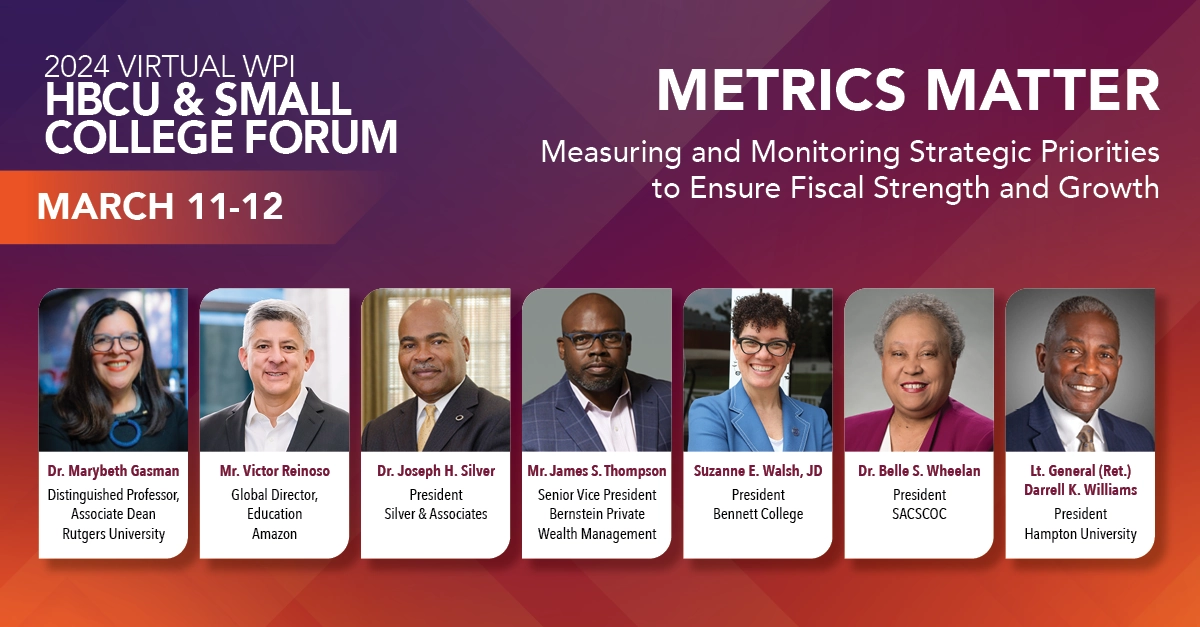
THE WESLEY PEACHTREE INSTITUTE
HBCU & SMALL COLLEGE FORUM
March 11-12, 2024
Metrics Matter:
Measuring and Monitoring Strategic Priorities to Ensure
Fiscal Strength and Growth
Join your colleagues and industry experts at the Virtual 2024 WPI HBCU & Small College Forum, designed for leaders, trustees, and consultants of HBCUs and small- to mid-size colleges.
Conducted in an interactive virtual format, the Forum features 20+ sessions that address critical issues impacting institutes of higher education. The Forum also connects university leaders to companies who can help them maximize their resources, generate revenue, and increase the efficacy of daily operations
The Wesley Peachtree Institute started the Forum more than two decades ago in an effort to reverse the trend of colleges losing accreditation due to financial unpreparedness. Since its inception, the Forum’s reputation and popularity has grown, attracting hundreds of executives in higher ed every year.
This is your opportunity to discover and execute proven strategies to ensure your college is ahead of the curve and prepared for the future.
Built for the Future
20+ Dynamic Sessions and Interactive Networking Opportunities
- Learn more about financial trends impacting HBCUs and small colleges- and ways to leverage them to your advantage
- Engage with higher ed experts, consultants, and high-profile leaders in the sector.
- Get up-to-date information about regulatory changes.
- Discover actionable strategies and best practices to maximize funding, attract donors, increase retention rates, and ensure your institute can prosper financially.
CONFERENCE TRACKS
Choose from more than 20 sessions, within four distinct tracks, all focused on ensuring fiscal strength and growth. Conference tracks include:
- Fundraising & Endowments
- Student Success & Institutional Planning
- Financial Strength & Governance
- Courageous Leadership
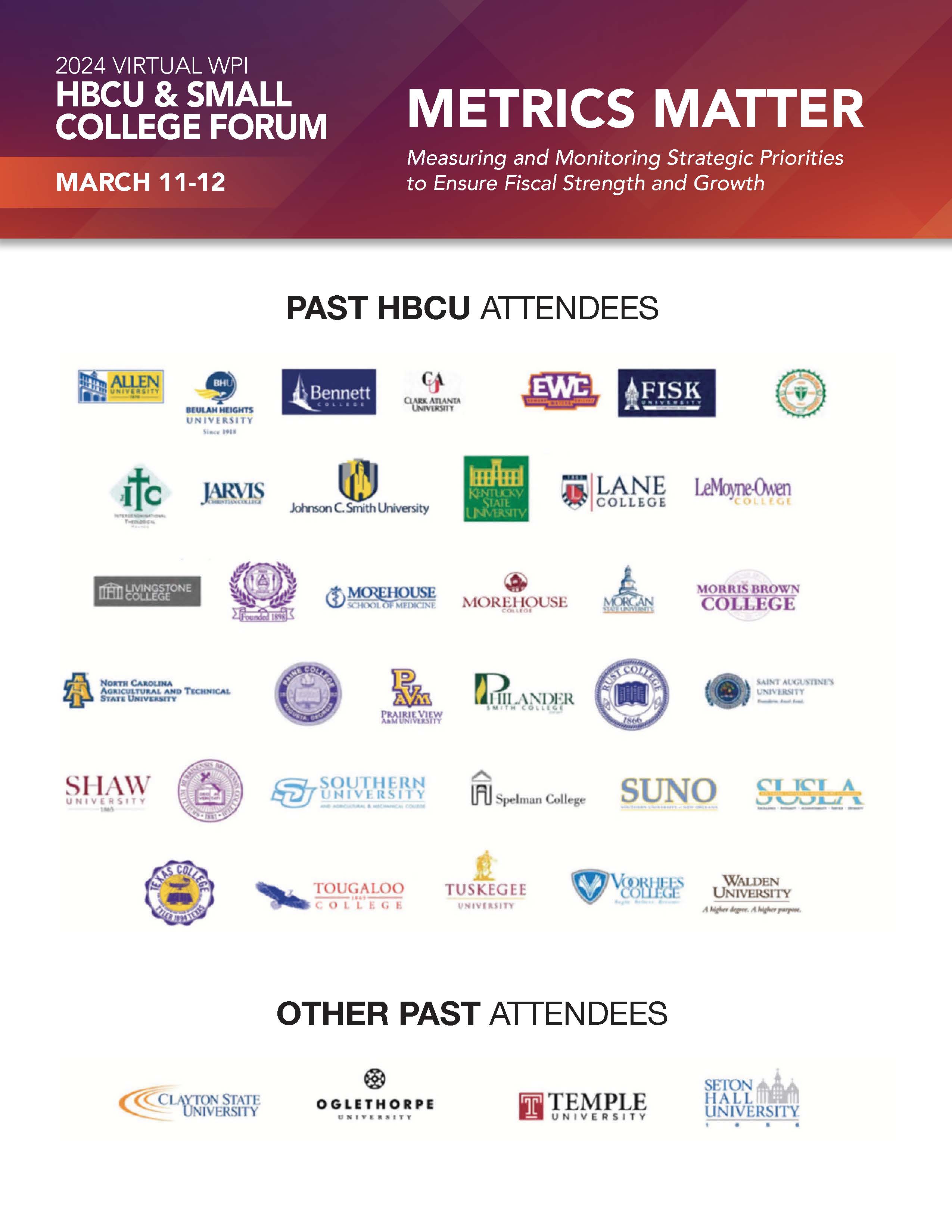
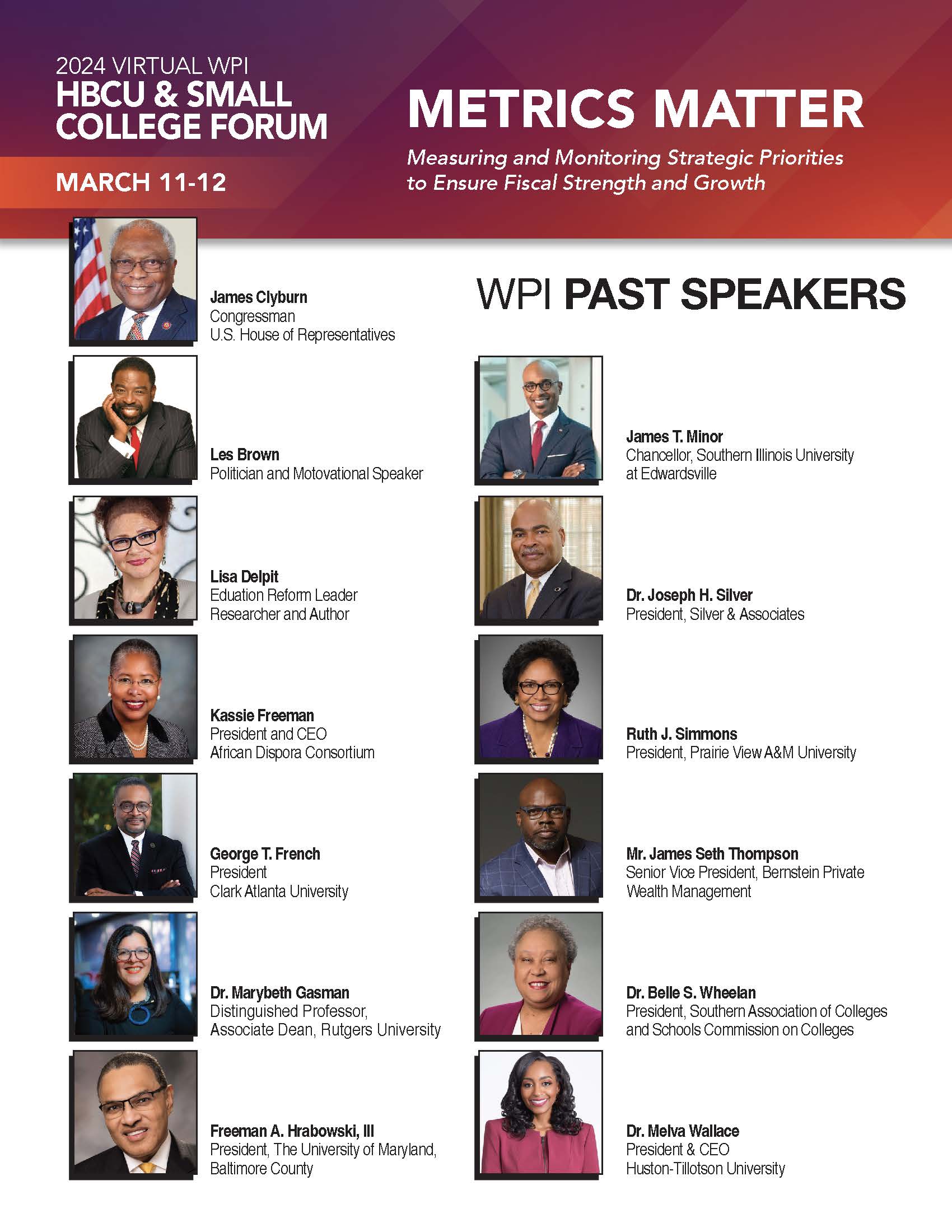
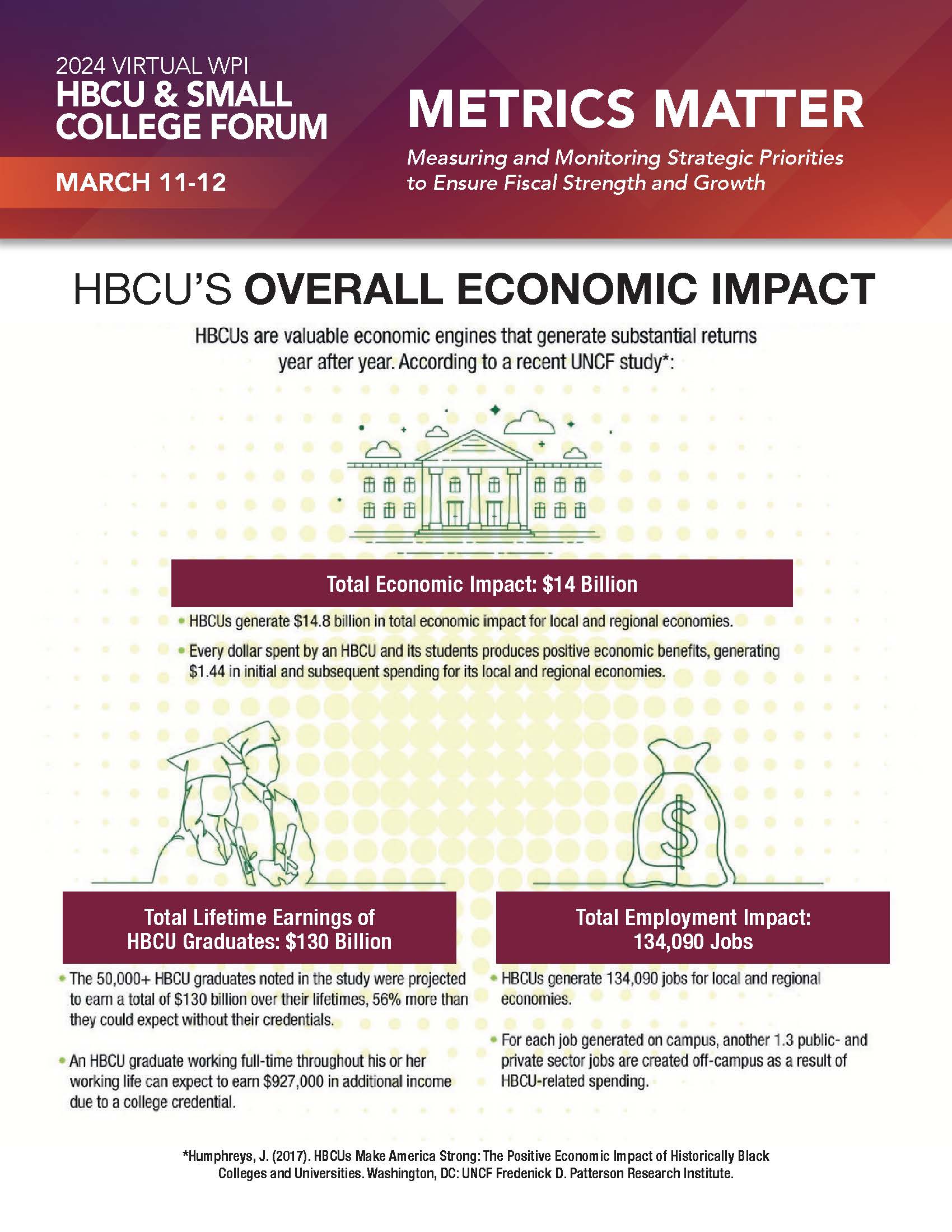
EVENT SPONSORSHIP
Interested in partnering with the Forum to promote your company’s services? Click the button to find out more about becoming a Forum sponsor.
EVENT HOSTS


EVENT SPONSORS



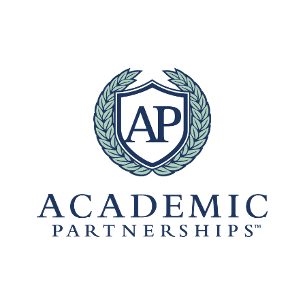



The Wesley Peachtree Institute
Improved Strength and Resilience for Institutions of Higher Education
Our Mission
Our mission is to perform research, study, and analysis that yields actionable information which we can share with institutions of higher education to help them achieve their missions. Read more about our goals here.

Our Vision
While we seek to benefit the sector as a whole, our primary focus is on minority-serving institutions. To that end, we offer practical training and consulting for executives, administrators, managers, and staff.

Our Ethics
Integrity transparency, accuracy, completeness, and use of sound methodologies are the guiding principles for our research, studies, and investigations.

Our Team
Our use of seasoned experts and professionals committed to imparting practical work applications provides a sound foundation for our training sessions and materials.
Our Goals
Increasing Success Across the SectorLeveraging Information
The higher education landscape is covered with meetings and conventions about facilities, academics, gender equity, racism, tenure, student disciplinary problems, student retention, athletics, many other topics. Typically, in any given year, a wealth of information is presented at conventions, forums, symposiums, and meetings. Attendees can keep abreast on whatever is topical for the group convened. Conversations often continue in the hallways, lounges, and bars. Participants dissect, weigh, judge, and deconstruct the substance of the presentations. Whatever the particular case, these gatherings generally provide valuable information and insights. Yet, it would be difficult for any one individual to attend all the conventions. What's needed is a clearinghouse of sorts to make information available so that the benefits are attainable.
The WPI plan includes measures designed to facilitate dialogues on successful tactics; on the implications of new events; and on where further research is needed. WPI will offer coordinated meets to address the needs of nonprofit minority-serving institutions to help develop and quantify unique problems and challenges to assist in their missions of educating disadvantaged youth. More importantly, WPI will conduct and make available its own research to help minority-serving institutions: solidify their fiscal foundations, enhance leadership and administrative practices, and ultimately improve student outcomes.
There are few issues in higher education more critical and political than retention and ultimately graduation rates. There is a considerable body of literature that discusses and describes the problem, and even some research that points to variables that might be associated with it. There are countless untested or at best, unproven strategies as to what needs to be done. Each institution has a commitment to improving its results, but is constrained by mission and resources.
To address this issue, WPI's goals includes the establishment of a central library of materials relevant for and accessible by HBCUs and other minority-serving institutions. WPI will also create a detailed national database of information to help institutions combat low retention and completion rates. The database will include information on exit points correlated to those exiting at each point.
WPI's goals also include strengthening institutional research capabilities at minority-serving institutions. Specifically, WPI will sponsor research on data-driven, actionable propositions to improve retention. Field testing of data-driven research-based models will be published, shared, and used in consultations.
Our focus is on assisting minority-serving institutions in implementing the U.S. Department of Education mandates for higher education while positioning themselves achieve sustainable excellence by increasing enrollment, retention, and graduation rates.
The Wesley Peachtree Institute
Improved Strength and Resilience for Institutions of Higher EducationThe Wesley Peachtree Institute. Our name may sound familiar. Yes, we are affiliated with the Wesley Peachtree Group, CPAs (WPG), a firm long known for providing financial, accounting, staffing, and consulting to institutions of higher education. For decades, WPG has specialized in addressing the needs of minority-serving institutions. The newly formed Wesley Peachtree Institute (WPI) is further evidence of WPG's dedication and support of MSIs. WPI is the vision of Don K. Murphy, CEO and managing associate of WPG.
The Wesley Peachtree Institute is a non profit corporation organized to provide information, research, training, and consultation for administrators and staff of minority-serving institutions. Our vision is to provide research data that will help strengthen minority-serving institutions. Our efforts will initially be focused on improving retention and graduation rates, ensuring administrators are financially literate and have a firm grasp of current economic practices, improving financial management skills, enhancing leadership capabilities, and refining administrative and customer service practices. A key component of these services is information sharing. We hope to ignite and inspire dialogue that strengthens the entire sector. Be sure to attend our annual WPG HBCU Forum where we share strategies for success.
A New Vision For Stronger Institutions

Accreditation Preparation
As higher education specialists, we have in-depth experience with accreditation. The full range of audit services that we provide reflects the essential expertise critical to the accreditation process.
Our audit products not only comply with generally accepted accounting practices (GAAP) and mandatory reporting practices, but also are constructed to readily provide documentation of that compliance. Such documentation is essential to navigating the accreditation processes successfully.

Procedure Calibration
We provide consulting services that help institutions craft work flows, implement standardized procedures, and cultivate a culture of compliance with evidence. These services ensure timely financial audits and federal compliance audits. Specific services include:
- • Formatting financial for review
- • Defining assets (plant) and liabilities (plant debt) for presentation
- • Reviewing your compliance narratives
- • Assisting in developing compliance narratives

Response Facilitation
We provide consulting services that facilitate focused, concise responses for monitoring reports. Our services are particularly geared to address time-sensitive needs.
Specific services include:
- • Analyzing a finding of noncompliance
- • Analyzing fluctuations in financial indicators
- • Identifying additional financial indicators that exist
- • Responding to monitoring reports
Financial Literacy
Building on core strengthsThe importance of a strong economic foundation can not be overstated. While their missions are not rooted in profit, a college or university that does not keep adequate reserves jeopardizes its very existence.
College Finances
In higher education, senior leaders and administrators seldom arrive at their positions with a good and actionable understanding of college finances. With the exception of chief financial officers, individuals come to their roles with strengths in other areas and often have little experience with financial matters.
WPI will offer broad support to improve financial literacy at nonprofit organizations. WPI will offer workshops specifically designed to assit nonprofit colleges and universities by providing training and professional and development opportunities for administrators, directors, and staff.
Financial Management
Protecting Students and InstitutionsWhether it is a player eligibility mix-up, employee misconduct, late audit submission, or maintaining insufficient cash reserves, noncompliance with the myriad of rules and regulations can be costly.
Compliance
Acts of Congress and federal rule-making constantly add to regulations regarding how colleges and universities can spend, account for, and report on their financial resources. Rating agencies, accrediting agencies, and the NCAA regularly create new ratios, presentations, and reporting formats. The administrative burden can be overwhelming. With so many demands, CFOs and their staffs must retool and run fast just to stay in place.
WPI will offer financial management workshops and educational programs designed to ensure institutions have the requisite knowledge to keep up with non-academic administrative demands. Our programs will help onboard new CFOs, provide consultation regarding federal requirements, NCAA regulations, and accreditation compliance.
Contact Us
Keep in Touch with WPIMetro-Atlanta Office
1475 Klondike Road Suite 100 Conyers, Georgia 30094


